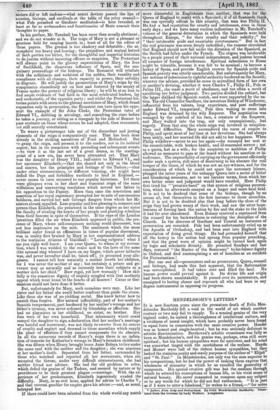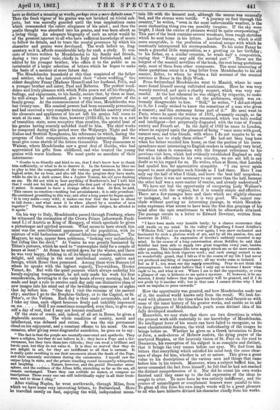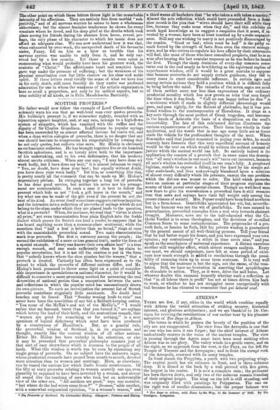MENDELSSOHN'S LETTERS.*
IT is now fourteen years since the premature death of Felix Men- delssohn Bartholdy left a void in the world of art which another century or two may fail to supply. To a musical genius of the very highest order, he united a thoroughness of intellectual culture, and a vividness of moral insight, which have probably never been found in equal force in connexion with the same creative power. Handel was as honest and single-hearted ; but he was seriously deficient in artistic discrimination. Beethoven's artistic conscience was fully as keen as Mendelssohn's, and his genius was, perhaps, even still more spiritual; but his human sympathies were far narrower, and his mind was somewhat tinged with the morbidness of the recluse. Haydn and Mozart were full of the richest human sympathies, but they lacked the stainless purity and manly purpose of the author of" Elijah" and "St. Paul." In Mendelssohn, not only was the man superior to his compositions, but he had the power of making them express that wholeness of character in which he so excelled the generality of composers. His special creative gift was but the medium through which he uttered his conceptions of human life, or his vivid sense of natural beauty. He never consented to compose upon any subject or to any words for which he did not feel enthusiasm. "It is just as if I were to utter a falsehood," he writes to a friend,—" for notes
• Letters from Italy and Switzerland. By Felix Mendelsaohn 13artholdy. Tram- Isted from She German by Lady Wallace. Longman&
have as distinct a meaning as words,perhaps even a more definite sense." Thus the fresh vigour of his genius was not lavished on trivial sub- jects, but was sacredly guarded until the true inspirations came which commanded the entire allegiance of his mind; • and then the poetic thought was absorbed into his genius, and was born afresh as a living thing. An adequate biography of such an artist would be of the greatest interest to all who have sufficient knowledge of music to follow its details, and to trace the mental processes by which his character and genius were developed. The work before us, frag- mentary as it is, affords considerable help for such a study. It con- sists of letters written by Mendelssohn to his family and friends, during a two years' tour, chiefly in Italy and Switzerland, and is edited by his younger brother, who offers it to the public as an instalment Of a larger selection of letters which he hopes to make the basis of a memoir at some future day. The Mendelssohn household at this time consisted of the father and mbther, who had just celebrated their "silver wedding," the eldest daughter Fanny (Madame Hensel) and her husband, Felix, and a younger brother and sister, Paul and Rebecca. The perfect 'confi- dence and lively pleasure with which Felix pours out all his thoughts, feelings, and enjoyments, to his family, secure that, by them at least, he will always be understood, give a very pleasant picture of the family group. At the commencement of this tour, Mendelssohn was but twenty-one. His musical powers had been unusually precocious, and had received a very complete training, so that his mastery over all the elements and appliances of his art left his genius full room to work at its ease. It this time, however (1830-32), he was in a sort of transition state, more receptive than creative, the special bent of his genius having scarcely unfolded itself to him. The chief works he composed during this period were the Walpurgis Night and the Italian and Scottish Symphonies, his references to which, during the progress of their composition, are extremely interesting. But we must give some sketch of the letters themselves. They commence at Weimar, where Mendelssohn saw a great deal of Goethe, who had appreciated his gifts from childhood, and who treated the young genius with warm kindness. We must quote an anecdote of their intercourse:
" Goethe is so friendly and kind to me, that I don't know how to thank him sufficiently, or what to do to deserve it. In the forenoon he likes me to play to him the compositions of the various great masters, in chrono- logical order, for an hour, and also tell him the progress they have made, while he sits in a dark corner, like a Jupiter Tonans, his old eyes flashing on me. He did not wish to hear anything of Beethoven's, but I told him that I could not let him off and played the first part of the symphony in C minor. It seemed to have a strange effect on him. At first, he said, This causes no emotion—nothing but astonishment; it is only grandiose. He continued grumbling in this way, and after a long pause he began again: It is very noble—very wild; it makes one fear that the house is about to fall down ; and what must it be when played by a number of men together!' During dinner, in the midst of another subject, he alluded to it again."
On his way to Italy, Mendelssohn passed through Presburg, where he witnessed the coronation of the Crown Prince (afterwards Ferdi- nand I.) of Austria as King of Hungary, of which spectacle he gives a picturesque and spirited account. What seems to have struck him most was the semi-Oriental appearance of the population, with its mixture of wild barbarism and ‘f almost fabulous magnificence." The Magyars, he says, appear born noblemen, "looking very melancholy, but riding like the devil." At Venice he was greatly fascinated by Titian's pictures, which he used to "contemplate daily for a couple of hours at least." At Rome he settled dpwn for the winter, and there he was very happy, drinking in all its Manly and wonder with intense delight, and mixing in the most intellectual society, native and foreign, which Rome then possessed. Among these were Bunsen (of whom he speaks with the highest regard), Thorwaldsen, Horace Vernet, &c. But with the quiet purpose which always underlay his keenly-enjoying temperament, he not only made his work his first consideration, devoting to it the early hours of every morning, but he made and kept a rule to receive each day only one distinctive class of new 'maps into his mind out of the bewildering concourse of sights ' that lay before him. "One day I visit the remains of the ancient city ; another Igo to the Borghese Gallery, or to the Capitol, or St. Peter's, or the Vatican. Each day is thus made memorable, and as I take my time, each object becomes firmly and indelibly impressed on me Still I am sometimes compelled, even then, to give my- self a day of rest, that I may not become confused."
Of the state of music, and, indeed, of all art in Rome, he gives a deplorable account. The whole condition of society, moral and intellectual, was debased and rotten. It was the one permanent cloud on his enjoyment, and a constant offence to his mind. On one occasion, after giving some disgraceful anecdotes, he goes on to say : "The fact is that the people are mentally enervated and apathetic. They have a religion, but they do not believe in it ; they have a Pope and a Go- vernment, but they turn them into ridicule ; they can recal a brilliant and heroic past, but they do not value it. It is thus no marvel that they do not delight in art, for they are indifferent to all that is earnest. It is really quite revolting to see their unconcern about the death of the Pope, and their unseemly merriment during the ceremonies. I myself saw the corpse lying in state, and the priests standing round incessantly whispering
and laughing Nature, however, and the genial December atmo- sphere, and the outlines of the Alban hills, stretching as far as the sea, all remain unchanged. There they can scribble no names, or compose no inscriptions. Those every one can still individually enjoy M all their fresh- ness, and to those I cling."
After visiting Naples, he went northwards, through Milan, from which we have sonic very interesting letters, to Switzerland. Here he travelled mostly on foot, enjoying the wild, independent moan- tai life with the keenest zest, although the season was unusually bad, and the storms were terrific. " A journey on foot through this country," he writes, " even in the most unfavourable weather, is the most enchanting thing you can possibly imagine. If the sky were bright, I think the excess of pleasure would be quite overpower ." This part of the book contains several woodcuts, from rough ske es which he sent home in his letters. Another feature, w1ich is still more acceptable, is the profusion of musical scraps with which he constantly interspersed his correspondence. To his sister Fanny he sends a graceful httle composition, as a greeting on her birthday; to his father, on a similar occasion, he sends half a composition, saying that "Fanny may add the second part.' These are the longest of the musical novelties of the book, the rest being quotations only, most of them from other composers. The most interesting of these quotations occur in a long letter from Mendelssohn to his old master, Zelter, to whom he writes a full account of the musical services at Rome in the Holy Week. From Switzerland Mendelssohn went to Munich, where he once more found himself among cultivated musicians. Here he was very warmly received, and gave a charity concert, which was very suc- cessful. At the last rehearsal he was obliged, by etiquette, to make a set speech of invitation to all the performers, which was ex- tremely disagreeable to him. "Still," he writes, "I did not object to it, for I really wished to know the sensations of a man who gives a concert; and this ceremony forms part of it." He next went to Paris where he spent the winter of 1831, pleasantly enough, so far as his own musical reception was concerned, which was both cordial and intelligent—but perpetually disgusted with the tone of French society and French art. In the April of 1832 he came to London, where he enjoyed again the pleasure of being "once more with good, earnest men, and true friends, with whom I do not require to be on my guard, nor to study them either." He had not been long here when his father recalled him home, so that the portion of his corre- spondence most interesting to English readers is unhappily very brief, but when taken in connexion with the frequent references to his previous visit here, which had evidently established England as only second in his affections to his own country, we are not left in any doubt as to his regard for us. He writes, when. at Rome, that London had spoiled him for appreciative sympathy. "I can never again expect to meet altogether such friends as 1 had there. Here I can only say the half of what I think, and leave the best half unspoken; whereas there it was not necessary to say more than the half, because the other half was a mere matter of course, and already understood."
We have not had the opportunity of comparing Lady Wallace's translation with the original, but it is usually simple and effective. There are a few passages here and there which are slightly obscure or inelegant, but as a whole it is very good. We cannot con- clude without quoting an interesting passage, in which Mendels- sohn expresses what seems to have been the first dim gropings of his mind after the epic creativeness to which he afterwards attained. The passage occurs in a letter to Edward Devrient, written from Lucerne in 1831:
"I have been made very humble lately, by a chance occurrence that still dwells on my mind. In the valley of Engelberg I found Schiller's "Wilhelm Tell," and on reading it over again, I was anew enchanted and fascinated by such a glorious work of art, and by all the passion, fire, and fervour it displays. An expression of Goethe's suddenly recurred to my mind. In the course of a long conversation about Schiller, he said that Schiller had. been able to supply two great tragedies every year' besides other poems. This business-like term supply struck me as the moreremark- able on reading this fresh vigorous work ; and such energy seemed to me so wonderfully grand, that I felt as if in the course of my life I had never yet produced anything of importance; all my works seem so isolated. I feel as if I, too, must one day supply something. Pray do not think this presumptuous ; but rather believe that I only say so because I know what ought to be, and what is not. Where I am to find the opportunity, or even a glimpse of one, is hitherto to me quite a mystery. If, however, it be my mission, I firmly believe that the opportunity will be granted, and if I do not profit by it another will; but in that case I cannot divine why I feel such an impulse to press onwards."
How the opportunity was granted, and how Mendelssohn made use of it, the musical world knows only from the result. We look for- ward with pleasure to the time when his brother shall furnish us with some of the inner history of his greater works, and enable us to add to these glimpses of Mendelssohn's youth some distinct idea of his fully developed manhood. Meanwhile, we may state that there are two directions in which the present work adds materially to our knowledge of Mendelssohn. No intelligent lover of his music can have failed to recognize, as its most characteristic feature, the vivid individuality. of the images he brings before us. Whether he gives us a Greek invocation to Eros or Jove, a mob-chorus of Hebrew zealots, the dying prayer of the martyred Stephen, or the heavenly vision of St. Paul on the road to Damascus, his conception of his subject is so complete and distinct, that it brings the very scenes before our eyes. We find from his letters that everything which satisfied his mind took the same clear- ness of shape for him, whether in art or nature. This gives a great value to his descriptions of the various men and t that came before him in his travels. Moreover, when a subject b I ed him, he never concealed the fact from himself; he felt that he had not reached the distinct comprehension of it. Nor did he count his own works finished until they came up to the full expression of the ideas he sought to utter. To mere fame he was entirely indifferent; and the praises of unintelligent or complaisant hearers were painful to him. To glean all this from his own simple words will be a great pleasure to all who have hitherto divined his character chiefly from his works. The other point on which these letters throw light is the remarkable intensity of his affections. They are entirely free from morbid "sub- jectivity," and of all nervous worries he seems to have a wholesome abhorrence; but the almost feminine tenderness he shows for every creature whom he loved, and his deep grief at the deaths which took place among his friends during his absence from home, reveal, per- haps, the only phase of his character to which his music does not afford an adequate clue. We can now understand how it was that, when exhausted by over-work, the unexpected death of his favourite sister, Fanny, fell on him as a blow so terrible that his nervous system was unable to rally from it, and he only sur- vived her by a few months. Yet those months were spent in commencing, what would probably have been his greatest work, the oratorio of "Christ." The affectionate heart and sensitive brain gave way under the pressure of suffering; but the weakness of his physical constitution cast but little shadow on his clear and noble spirit. If these letters recal vividly the sense of what we have lost in his early death, still more forcibly do they excite our profound admiration for one in whom the weakness of the artistic organization bore so small a proportion, not only to its noblest aspects, but to true nobility of all kinds, as in Felix Mendelssolin Bartholdy.
































 Previous page
Previous page